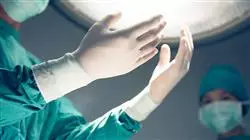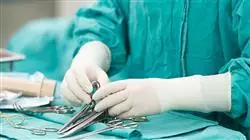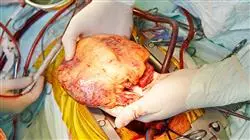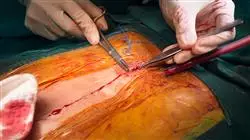University certificate
The world's largest faculty of nursing”
Description
Improve your knowledge through this program, where you will find the best didactic material with real clinical cases. Learn here about the latest advances in the specialty to be able to perform a quality practice”

Each of the wide variety of surgical interventions that are performed requires a specific procedure, a specific technique and the exclusive surgical material for that intervention. There are a series of steps and rules common to all of them that team members must know in detail, as well as how the entire surgical block functions so as to prevent and avoid the most common risks in professional practice. Healthcare institutions are well aware of this and demand academic profiles with a specialization that adapts to the requirements of the job and professionals who are qualified and endorsed to carry out the work.
This postgraduate diploma contains the most complete and updated scientific program in the market, having as its main objective the training in generic and specific competencies in a surgical process and facilitates the updating of the professional in a practical way and adapted to their needs. The modules that make up this master are oriented to update the knowledge of nursing professionals who already develop their functions in the surgical area for those where a high qualification is required and increase their professional competence in the provision of surgical nursing care to the patient, before, during and after surgery in a holistic way.
The innovative educational method, which includes real clinical cases and exercises to bring the development of the program closer to the surgical practice, is based on Problem Based Learning, through which you will have to try to solve the different situations of professional practice that arise throughout the program. For this reason, you will be assisted by an innovative interactive video system created by renowned and experienced experts in the field of radiology with extensive teaching experience. This ensures that the professional, whether or not they have worked in any of the sections that make up the perioperative process, integrates into their work practice the experience of professionals already working in leading hospitals at a national and international level with a high scientific, technological and humanistic level.
This knowledge will facilitate the provision of quality care throughout the surgical process to ensure the safety of the patient and the professional at all times.
Increase your competencies in the approach to Cardiac, Vascular and Thoracic Surgery for Nurses through this program"
This postgraduate diploma in ##TITULO## contains the most complete and up-to-date scientific program on the market. The most important features include:
- Development of clinical cases presented by experts in the different areas of multidisciplinary knowledge. Its graphic, schematic and practical contents, with which they are conceived, gather a scientific and practical information on those disciplines that are indispensable for professional practice
- Developments on Cardiac, Vascular and Thoracic Surgery for Nursing
- An algorithm-based interactive learning system for decision-making in the clinical situations presented throughout the course
- With special emphasis on evidence-based For Nursing and surgical nursing research methodologies
- All of this will be complemented by theoretical lessons, questions to the expert, debate forums on controversial topics, and individual reflection assignments
- Content that is accessible from any fixed or portable device with an Internet connection
This postgraduate diploma may be the best investment you can make in the selection of a refresher program for two reasons: in addition to updating your knowledge in Cardiac, Vascular and Thoracic Surgery, you will obtain a postgraduate diploma by TECH Global University"
Its teaching staff includes health professionals belonging to the field of Dental nursing, who bring to this Specialization their work experience, as well as recognized specialists belonging to leading scientific societies.
Thanks to its multimedia content developed with the latest educational technology, they will allow the professional a situated and contextual learning, that is to say, a simulated environment that will provide an immersive learning programmed to prepare in real situations.
The design of this program is based on Problem-Based Learning, by means of which doctors must try to solve the different professional practice situations that arise throughout the academic year. This will be done with the help of an innovative interactive video system developed by renowned experts in the field of surgical nursing with extensive teaching experience.
Increase your confidence in decision making by updating your knowledge through this postgraduate diploma in Cardiac, Vascular and Thoracic Surgery for Nursing"

Don't miss the opportunity to update your knowledge in cardiac, vascular and thoracic surgery to improve patient care"
Objectives
The main objective of the program is the development of theoretical and practical learning, so that the nurse can master in a practical and rigorous way the study of Cardiac, Vascular and Thoracic Surgery.

This refresher program will generate a sense of confidence when practising nursing, which will help you grow both personally and professionally”
General Objectives
- To update the knowledge of advanced practice nurses in perioperative care in the different medical-surgical specialties, through evidence-based nursing
- Promote work strategies based on perioperative patient care as a reference model in the achievement of healthcare excellence
- Encourage the acquisition of technical skills and abilities, through a powerful audiovisual system, and the possibility of development through online simulation workshops and/or specific education
- Encouraging professional development through research and dynamic and up-to-date continuous Training
Objetivos Específicos
Module 1. Perioperative Surgical Process
- Explain and define the perioperative surgical process, and its three component stages
- Define the skills and abilities of a nursing professional in surgery, internalizing what their qualities and aptitudes should be
- Identify the different areas in which the surgical process takes place, and its interrelation with other support services
- Be aware of the importance of reciprocal information between the patient/family and the nursing professional during the whole surgical process
- Control or minimise the patient's level of anxiety, typical in these situations, as well as pain if present
- Acquire the necessary knowledge to carry out all nursing interventions, depending on the surgical moment
- Learn how to welcome the patient/family, whether in the bedding room, in the operating theatre or in resuscitation
- Learn the most commonly used anesthetic techniques in perioperative medicine, indications and complications
- List the drugs frequently used in the anesthetic procedure, their mechanism of action and side effects, knowing how to act according to the drug administered
- Learn about the different roles of the operating theatre circulator and the scrub nurse in the operating theatre
- Be prepared to collaborate with the rest of the surgical team in the correct management of potential complications
- Learn to collaborate with the rest of the team in the transfer and positioning of the patient, ensuring their comfort and safety at all times
- Communicate the necessary information about the patient to the nursing professional who will assume the subsequent care of the patient
- Prepare the patient for discharge when the required care can be provided outside of the hospital
- Acquire the necessary knowledge for each surgery about the anatomy of the area to be operated on, the necessary equipment, consumables and instruments, and the required anaesthesia and positioning
- Describe the specific training of the nursing professional in the different surgical specialities
Module 2. Cardiac Surgery
- Acquire the necessary skills to handle heart valve implants (whether mechanical, biological or rings)
- Explain the role of microsurgery nurses in performing aorto-coronary bypass surgery and the management of autologous vascular grafts required for this surgery
- Differentiate between the different types of implants that can be used in aortic surgery and the care they require
- Master the procedures for intervening in emergencies where the patient's life is at great risk , be able to act with temperance and control, having all the necessary equipment for these cases at hand beforehand
- Master the procedures of total or partial surgical resection of the pericardium, including the technique of placing thoracic drains
- Control the use of leads and generators used in pacemaker or ICD implantation/removal
- Explain the intraoperative and postoperative management of balloon counterpulsation and ventricular assist monitors, devices and systems
- Describe the competencies of the perfusionist nurse, and to acquire a basic understanding of the function of the heart-lung machine, which is essential for most heart operations
- Explain the surgical process , of coronary and valve surgeries, as well as pacemaker and/or automatic implantable defibrillator implantations and other surgeries (e.g. short-, medium- and long-term re-interventions), as well as the surgical technique to be followed
Module 3. Thoracic surgery
- List the units collaborating with the thoracic surgery service
- Explain the usual protocols in each department
- Providing the necessary material for each surgical intervention
- Summarise the anatomo-physiology of the respiratory apparatus
- Justify the need for certain types of medicines inside a thoracic surgery operating theatre
- Identify the pathologies susceptible to be treated in the thoracic surgery operating theatre
- Differentiate between programmed and urgent pathologies
- Explain the proper handling and positioning of the different devices, , basic and specific instruments and , describe the surgical techniques used
- Identify chemical pleurodesis from mechanical pleurodesis, as well as the surgical technique to be followed
- Assess the psychological state of patients and develop relational tools to help alleviate the stress involved in the surgical process
- Identify hospitals that have a thoracic surgery department
- Determine the human and material resources needed to assist each surgery
- Define the surgical position of each intervention
- Integrate anatomical knowledge to describe the surgical technique for each intervention
- Generate the intraoperative nursing care document and prepare the patient for admission to the ward
- Develop a care plan using the intraoperative NANDA-NIC-NOC nomenclature
Module 4. Vascular Surgery
- Describe the handling of the different mechanical suture systems for anastomosis
- Distinguish the material and instruments to organise the preparation of laparoscopic or open surgery
- React in situations of change of surgical plan (laparoscopic to open surgery) if there are potential complications
- Explain the operation of the different types of vessel sealing and cutting forceps required for different surgeries, whether open or laparoscopic
- Explain the placement and handling of equipment and instruments (gas insufflator, camera, cold light source, screens, etc.) in laparoscopic surgeries
- Identify the different types of meshes for hernia repair
- Addressing the management of the THD system for haemorrhoids
- Describe the use of radiofrequency techniques to remove small tumours
- Describe the handling of the radioactivity indicating probe in sentinel lymph node biopsy surgeries
- In emergency situations, prepare the material and instruments for hemostasis (different hemostatics, clans, etc.) taking into account the possibility of encountering different types of bleeding
- Identify the risk of deep vein thrombosis in long-term surgeries and be able to apply pneumatic compression stockings to the patient

Make the most of this opportunity and take the step to get up to date on the latest developments in Cardiac, Vascular and Thoracic Surgery for Nursing”
Postgraduate Diploma in Cardiac, Vascular and Thoracic Surgery for Nursing
Each of the wide variety of surgical interventions that are performed daily require a specific procedure, very specific techniques and exclusive surgical material for each case. Therefore, it is important that the members of the surgical team master with solvency the steps and rules to follow to prevent the risks that arise during surgery, especially in some as sensitive as cardiac, thoracic or vascular. And it is in this context that this Postgraduate Diploma in Cardiac, Vascular and Thoracic Surgery for Nursing is born, which will be your best asset to update your care strategies in these procedures.
Enroll in a unique Postgraduate Diploma in Cardiac, Vascular and Thoracic Surgery for Nursing
This Postgraduate Diploma in Cardiac, Vascular and Thoracic Surgery for Nursing is positioned as a great opportunity for you to excel in total or partial surgical resection procedures of the pericardium, including the technique of placing thoracic drains. In fact, you will go through the entire perioperative surgical process and the specificities and requirements of Cardiac, Vascular and Thoracic Surgery. All this and more will be at your fingertips from home or anywhere thanks to the online nature of the title. In addition, you will be able to download at any time of the day the academic resources from the Virtual Campus to consult them without the need to connect to the Internet.







